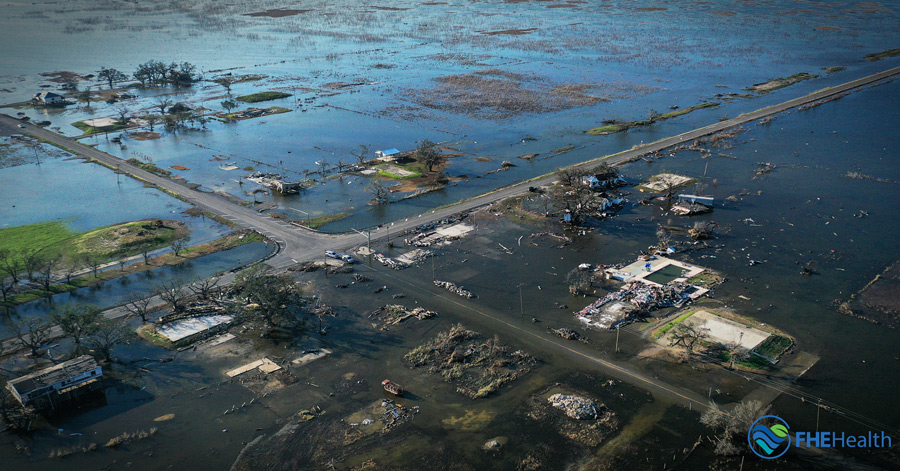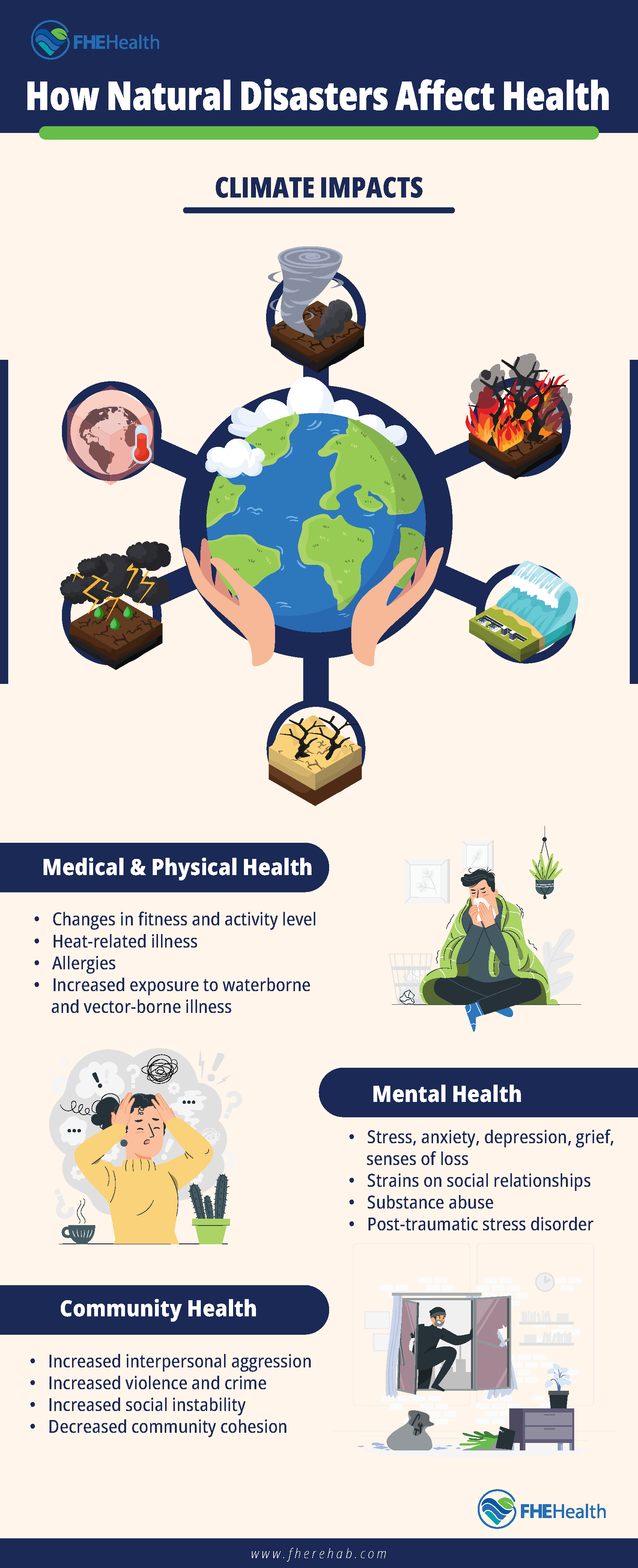
When Hurricane Helene made landfall in September 2024, no one could have predicted that it would become the deadliest hurricane to make landfall since Katrina. The category 4 storm laid waste to whole communities along its 500-mile path, from Florida through other parts of the Southeast. Meanwhile, as the death count from Helene continued to rise above 230, with hundreds still missing, some of the same communities hit hardest by Helene were bracing for another hurricane less than two weeks later: Milton, Category 5.
Life can be overwhelming after a natural disaster. The traumatic loss of life, property, livelihood, and identity, in some cases all at once, can take a huge toll on anyone’s mental health. Research by the National Institutes of Health has found that suicide rates increase after severe earthquakes, floods, and hurricanes, sometimes significantly. That makes mental health support a critical component of emergency preparedness. In the sections that follow, we’ll provide some advice for prioritizing your mental health while navigating natural disasters. If you’re struggling, these coping tools from expert Dr. Beau A. Nelson may also help.
What’s Unique About the Trauma of a Natural Disaster
Most people feel a sense of control over their lives and believe that if they work hard, live ethically and make good decisions, they can enjoy security and predictability. Few things challenge this belief in the same way as natural disasters. The aftermath of events such as hurricanes can leave many feeling as though life as they know it is permanently gone. Any recovered sense of normalcy or control feels as though it could be taken away in an instant, resulting in a significant psychological impact on those who’ve experienced a natural disaster.
Following a destructive event such as a hurricane or tornado, many people spend weeks or months putting their life back in order—finding new housing, replacing lost furniture and clothing, recovering legal documents and rebuilding a sense of normalcy. For that reason, the mental and emotional effects of a natural disaster aren’t always immediately evident. In most cases, communities and individuals display remarkable resilience when it comes to dealing with the aftermath of a destructive event. However, for many people, the road back to normal isn’t an easy one. These people may deal with mental health issues long after the event is over and the damage is fixed.
How Do Natural Disasters Affect People’s Lives?
Living through traumatic events that have the potential to be life-threatening, or have actually been deadly to others, can have a significant impact on someone’s mental health. They can bring on a range of stressors that impact a person’s sense of security, including jeopardized housing stability, loss of income, or loss of valued possessions.
Post-traumatic stress disorder, anxiety disorders, depression, and substance use disorder are among the most common mental illnesses that may be connected to surviving a significant natural disaster. These issues may resolve on their own after a few days or weeks as life returns to normal, but for some people, they persist for years.
In some cases, individuals may experience more serious and disruptive symptoms following a natural disaster. These may include:
- Changes in appetite
- Increased substance use
- Loss of interest in previously enjoyed activities
- Difficulty connecting with friends and family
- Difficulty concentrating
- Feelings of sadness or hopelessness
- Panic attacks
- Easily startled
- Changes in sleep habits, either sleeping too little or too much
- Avoiding talking about, remembering, or watching news stories about the disaster
- Nightmares
- Intrusive thoughts and memories
- Irritability
- Increased sense of fear and anxiety
Many people also experience survivor’s guilt. If they lost a loved one to the event, they may wonder why their own life was spared. If their personal loss was minor compared to that of others, they may feel guilty that they fared well when someone else didn’t.
The Phases of a Disaster
Most disasters feature specific phases, each of which can have a significant impact on how an individual handles the event, how long it takes them to recover, and how they think of the possibility of future disasters.
The Anticipation Phase
Some natural disasters strike with very little warning, such as a tsunami or a tornado. Other disasters, such as hurricanes, may be tracked for days before landfall. During the anticipation phase, individuals likely to be affected may experience feelings of fear, dread, and uncertainty. Knowing that they may either incur a negligible loss or that they could lose everything they own makes it difficult to emotionally prepare for a dangerous event.
The Event
The event itself may be the shortest phase of a disaster, but it’s typically the most intense. At this time, individuals affected may experience a higher degree of fear and uncertainty, and confusion can complicate matters when people hear conflicting reports and instructions. Depending on circumstances, individuals may feel an increased need for self-preservation and protecting their own household.
The Heroic Phase
In the aftermath of a natural disaster, there tends to be an influx of people hurrying to help those who were harmed. State and federal governments may send aid, and communities across the country may send groups to help clear debris, rebuild homes, and provide medical aid. Members within the community may also help with rescue and restoration efforts.
The Honeymoon Phase
As the community begins to collectively process the traumatic event, it enters the honeymoon phase. During this phase, there’s often a strong sense of camaraderie and optimism. This typically lasts until a few weeks after the event.
The Disillusionment Phase
After the emotional highs of the honeymoon phase, reality typically sets in. During this time, there may still be a strong need for relief services, but the rest of the nation has moved on. No one is sending financial resources or aid workers despite an ongoing need for practical assistance. This is the phase where individuals typically experience the most mental health problems, including feeling discouraged, stressed, or exhausted. This can last for months or years after the natural disaster.
The Rebuilding Phase
The last phase of a natural disaster is the rebuilding phase. At this time, those who’ve experienced losses are coming to terms with their new normal. They continue to process the event and grieve the losses they’ve experienced, but they’ve regained a sense of control and purpose. They may feel like they’re in a better emotional place to rebuild a life.
Preventing Further Emotional Harm after a Natural Disaster
Avoiding the next natural disaster may be impossible, but there are things people can do on a personal and a community level to reduce the emotional harm when one strikes. Among the most important things someone can do for their mental health in the short and long term is to maintain social connections and openly talk about the event. While many people are inclined to keep their feelings and thoughts to themselves and process everything internally, giving and receiving support during the aftermath of a traumatic event can build resilience. Support groups, for example, are found to be very helpful when it comes to processing a traumatic event.
It’s also helpful for individuals to keep their daily routine as consistent as possible following a natural disaster. Eating at regular intervals, trying to get sufficient sleep, and taking the time to go for a daily walk can help individuals manage stress and exhaustion. It’s normal to want to make significant life changes after a natural disaster, such as moving to a new place or making a significant job or relationship change. However, these decisions are better explored when emotions have cooled and life has returned to a sense of predictability.
Assessing the Impact of a Disaster on Mental Health
It can be surprisingly difficult to assess the connection between mental health and disasters. Everyone processes events at their own pace and in their own way, making it difficult for some to determine how disruptive a natural disaster was for them.
One useful tool for determining how significantly someone was affected by a natural disaster is the Impact of Event Scale. This simple test can be self-administered to give someone quick insight into how deeply a trauma may be affecting them. In general, signs that may indicate a person needs help following a traumatic event include avoidance, sleep disturbances, and intrusive thoughts.
How Counseling Benefits Those Who Live Through a Natural Disaster
While it may be difficult, talking about a traumatic experience such as a natural disaster with a trained mental health professional can be important for reclaiming your life. A counselor trained in disaster psychology can help you process your grief and any guilt you experience, teach you how to effectively manage stress, and resolve issues that arise after a trauma, such as substance use. For immediate help, contact us today to schedule an appointment.







